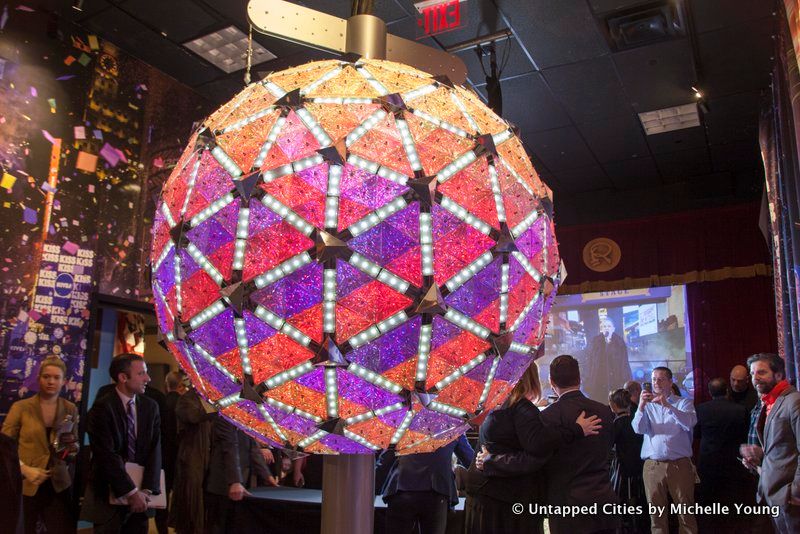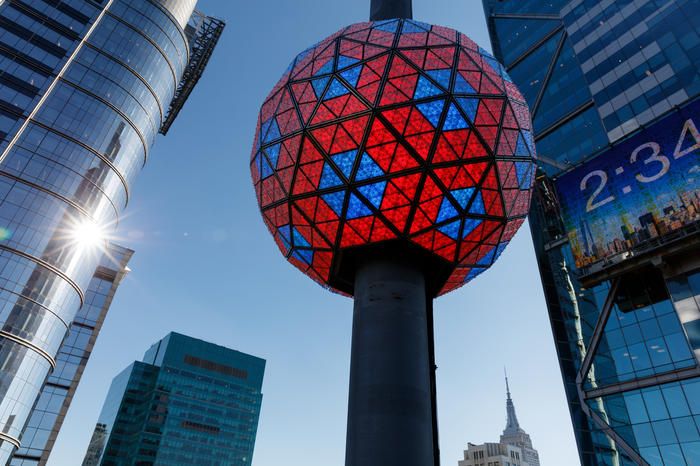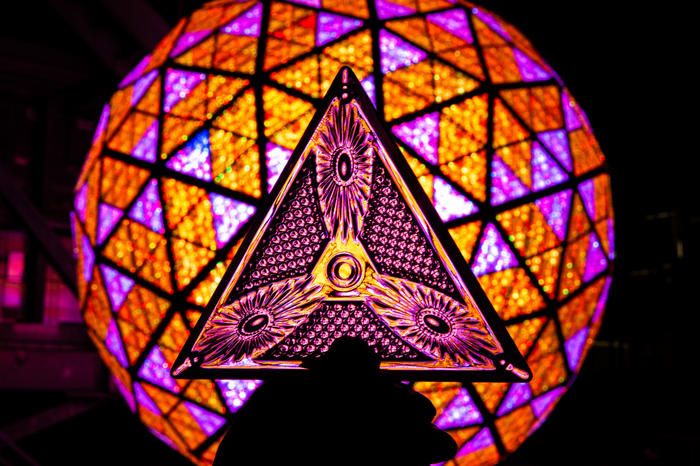Last-Minute NYC Holiday Gift Guide 🎁
We’ve created a holiday gift guide with presents for the intrepid New Yorker that should arrive just in time—


The large, glittering, colorful ball that drops from a pole atop One Times Square at the end of every year has come a long way since its 1907 debut. The first New Year’s Eve ball in New York City weighed about 700 pounds and had a five-foot diameter. Today, the ball is nearly 17 times heavier and twice as wide, weighing in at 11,875 pounds with a 12-foot diameter. In addition, while today’s ball is made of 2,688 Waterford crystals (and stored inside One Times Square), the first ball was made of wood, iron, and lit up by one-hundred 25-watt light bulbs. But how exactly did the ball evolve? Join us as we trace the evolution of this iconic piece of Times Square history through the decades!

New Year’s Eve was celebrated in Times Square starting in 1904 however the tradition of having a ball drop from the top of One Times Square did not start until 1907. That first New Year’s Eve celebration served a dual purpose, to usher in the New Year and to christen the new headquarters of The New York Times. Prior to Times Square’s New Year’s Eve celebrations, revelers would gather at Trinity Church downtown. The church was happy to see the raucous festivities move to midtown, where fireworks were shot up into the air above the crowds. In 1907, the city banned the firing of fireworks off the building and celebrants resorted to a new form of celebration adopted from maritime traditions: a ball drop.
A young immigrant metalworker named Jacob Starr built the first New Year’s Eve ball out of iron and wood and surrounded it with one-hundred 25-watt light bulbs. It took a team of six men to hoist the ball onto a flagpole on the atop One Times Square using rope. Once the ball descended from the pole and hit the roof, a five-foot tall sign lit up, indicating the new year. For most of the 1900s, Starr’s company, Artkraft Strauss, was in charge of descending the ball.

Image Courtesy of Countdown Entertainment
In 1920, the original ball was replaced by a 400-pound one made entirely out of wrought iron. A third iteration of the ball came in 1955 when an aluminum ball replaced the iron one. The new aluminum sphere weighed just 150 pounds. That new lightweight ball was used all the way into the 1980s. In the 1980’s, the ball was transformed into a glowing red apple with a green stem for the I Love New York marketing campaign. The apple version of the New Year’s Eve ball dropped for seven years, until the campaign ended in 1988. As the eighties drew to a close, the ball’s apple-red bulbs were replaced with classic white bulbs.
In 1995, the ball got a high tech upgrade. It was the first year a computer was used to control the ball. Still made out of aluminum, the ball was enhanced with new aluminum coverings, strobing lights and ten thousand rhinestones. The bedazzled ball was in use until 1999 when it was replaced to celebrate the new millennium.

GIF by Untapped Cities/Michelle Young
With the arrival 2000, the New Year’s Eve ball was entirely redone by Waterford Crystal and Philips Lighting. The sparkling new ball weighed 1,070 pounds and had over 600 halogen bulbs, 96 strobe lights and 504 triangular crystal panels. Though it used cutting edge lighting technology, it was also constructed with traditional materials as an homage to the past. The triangular crystal panels were engraved with annual hope-related themes, such as Hope for Abundance and Hope for Healing, a detail that could only be seen up close. At the time, it was the largest crystal ball in the world.
For the ball drop’s centennial anniversary with the arrival of 2008, Waterford Crystal came up with another new design, now the sixth iteration. This time, the crystal company created an icosahedral geodesic sphere with a diameter of six feet. Weighing in at about 1200 pounds, the new ball boasted a state-of-the-art lighting system made of multicolored Philips Luxeon LED lights which could be programmed by a computer to light up in millions of dazzling patterns. New LED bulbs replaced incandescent and halogen bulbs that had been used for the past one hundred years, making it significantly brighter and more colorful.
The Centennial Ball was only used for one year. In 2009, an even larger version was used. The seventh and most recent incarnation of the New Year’s Eve ball is twelve feet in diamater with a weight of six tons, twice as large as the centennial ball! Though it is significantly larger than all of its predecessors, the current ball is 30% more energy efficient than the previous version. Since 2009 was the first year the ball would be displayed year-round, Waterford made it weatherproof. From 2008-2013, the annual theme was “World of Celebration,” including themes like “Let There be Light” and “Let There be Peace.”
For the upcoming celebration of 2021, 192 new Waterford Crystal triangles have been added to the ball to represent the “Gift of Happiness.” The new design is represented by “a sunburst of bright cuts radiating outward like a beautiful sunny day bringing warm smiles and happiness.” Other “gifts” represented are the gift of goodwill, with three pineapples, the Gift of Harmony with small rosette cuts and the Gift of Serenity with “butterflies flying peacefully above a crystal meadow,” among others. These 2,688 shining Waterford Crystal triangles are bolted to 672 LED modules attached to the aluminum frame of the Ball. Beneath the crystal panels, red, blue, green and white LEDs allow for millions of color combinations and mesmerizing patterns.

Gift of Happiness Design, Image Courtesy of Countdown Entertainment
With all the advances in technology, it’ll be interesting to see what the Times Square ball will look like several New Year’s Eves from now. Since there will be no spectators allowed in Times Square to watch the ball drop in person, you can stream it on various platforms and create your own show on the Virtual New Year’s Eve app.
Next, take a look Behind the Scenes where the Times Square New Year’s Eve Ball is stored and discover the Top 10 Secrets of Times Square NYC.
This article was written by Stefanie Geier (@sgeier97) and Nicole Saraniero.
Subscribe to our newsletter